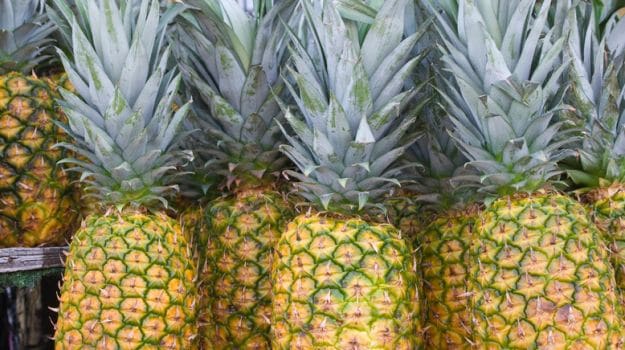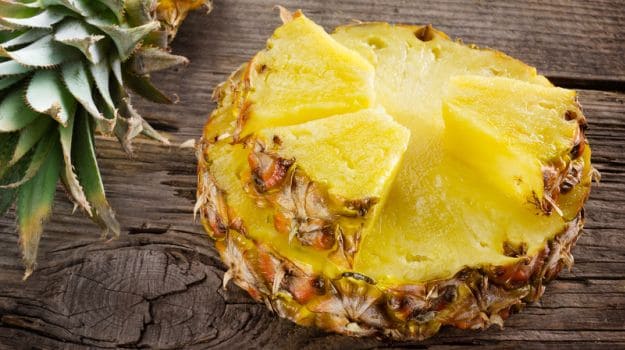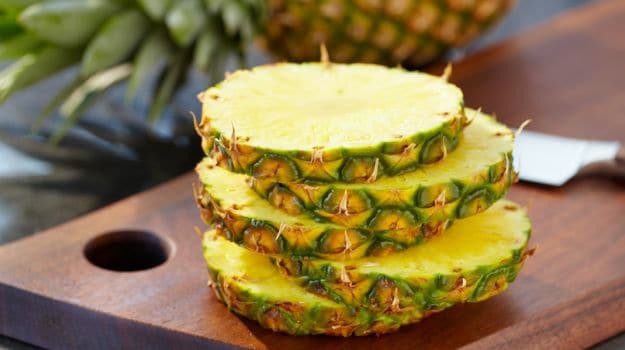Someone just has to utter the word 'pineapple' and picturesque landscapes marked by beaches, palm trees and umbrella-topped drinks come gushing to our mind. The sweet and sour taste of the much loved tropical fruit is remarkable. Referred to as 'Ananas comusus' due to its resemblance to a pine cone, the fruit is not really a fruit. It is rather a mass of individual berries fused to the central stalk. Each fruitlet can be identified by an 'eye', the rough spiny marking on the pineapple's surface. The leaves atop are actually the continued growth of the stalk, and the base area is high on sugar content and therefore offers a sweeter taste and more tender texture. The book History of Food attributes the origin of this quintessential tropical fruit to Brazil and Paraguay. In 1548, the Portuguese traders brought along the much coveted seeds to India. In fact, missionaries from Australia first imported their plants from India's soils during the early 19th century. The authenticity of aforementioned western narrative is challenged by the likes of Ancient India: History and Culture. The author stresses that pineapple has existed in the subcontinent for thousands of years. Its introduction dates back to the Maurya (322 to 185 BC) and Gupta Empire (320 to 550 CE). Pineapple is the third most canned fruit after applesauce and peaches. And, The Food and Agriculture Organization report (2009) presents India as the world's 7th leading pineapple producer. But amongst the innumerable verities cultivate, roughly seven can account for commercial importance - grown in humid regions along the Southern Peninsula and also the hills of the Northeast from July through September. Both, the golden ripe fruit and the little sweet green ones, are readily available from pushcarts to super marts in our country.
Pineapple is the third most canned fruit after applesauce and peaches. And, The Food and Agriculture Organization report (2009) presents India as the world's 7th leading pineapple producer. But amongst the innumerable verities cultivate, roughly seven can account for commercial importance - grown in humid regions along the Southern Peninsula and also the hills of the Northeast from July through September. Both, the golden ripe fruit and the little sweet green ones, are readily available from pushcarts to super marts in our country.
Here Are Some Health Benefits of Pineapple You Must Know:
1. An Anti-inflammatory AgentPineapple hails from the Bromeliaceae family, after which one of its most important health promoting compounds, the enzyme bromelain, was named. The complex mixture of its substances can act as a pain reliever, blood thinner and anti-coagulant, as well as an anti-inflammatory agent. Long story in short, it is nature's aspirin.
(Also Read: 10 Best Pineapple Recipes)

2. Cure for ConstipationThis miraculous fruit aids in the natural digestion process. The high quantity of fiber helps in the formation of stool and its quick movement though the tract, while the enzyme bromelain is known to help in the breakdown of protein. Pineapple juice, in particular, serves as a great laxative that cures constipation.
(Also Read: 8 Effective Remedies For Constipation Suggested By Ayurveda) 3. Helps in Burning Fat"Even though it contains sugar (extremely beneficial for growing kids), the amount is not so overwhelming. Plus, the amount of fat is negligible as well, making it a go-to-snack for the ones trying to shed kilos. The soluble fiber content contributes to a delayed digestive process, which helps to control hunger pangs and indirectly accounts for a boost in metabolism and calorie burn," says Bangalore-based nutritionist Dr. Anju Sood.
3. Helps in Burning Fat"Even though it contains sugar (extremely beneficial for growing kids), the amount is not so overwhelming. Plus, the amount of fat is negligible as well, making it a go-to-snack for the ones trying to shed kilos. The soluble fiber content contributes to a delayed digestive process, which helps to control hunger pangs and indirectly accounts for a boost in metabolism and calorie burn," says Bangalore-based nutritionist Dr. Anju Sood.
(Also Read: Pineapple Juice For Weight Loss: How To Use The Tarty Goodness To Shed Belly Fat) 4. Good for the EyesPineapple is a rich source of vitamin C, anti-oxidants and minerals like manganese and potassium. It helps fight against cell damage and reduces the risk of macular degeneration, an eye disease that affects older people. It is also a good source of beta carotene, essential for eye health.
4. Good for the EyesPineapple is a rich source of vitamin C, anti-oxidants and minerals like manganese and potassium. It helps fight against cell damage and reduces the risk of macular degeneration, an eye disease that affects older people. It is also a good source of beta carotene, essential for eye health.
(Also Read: Cucumber Slices for the Eyes: 5 Ways it Can Help You)

5. Regulates Blood Pressure and HypertensionMedical studies have established that a cup of pineapple contains (low amount) 1 mg of sodium and (high amount) 195 mg of potassium, which is vital for bringing down the blood pressure to a state of normalcy. Potassium is an essential mineral which helps in regulating blood pressure in the body.
(Also Read: 6 Foods To Have For Those Who Have Low Blood Pressure)

6. Counters InfertilityIf you are a woman struggling to conceive, pineapple can help. According to some experts the presence of a considerable amount of folic acid makes this possible. You can have tuck into them raw. or juice it or toss them in salads.  7. Vitamin PowerhousePineapples pack a tremendous nutritional punch, containing vitamins A, C, E, and K, minerals like potassium and calcium, electrolytes and phyto-nutrients like carotene. They are a rich source of anti-oxidants, which fight against free radicals in the body, preventing cell damage. These anti-oxidants can protect you from diseases like atherosclerosis, heart diseases, arthritis and various cancers. Vitamin A and Vitamin C are a boon for the skin as well.
7. Vitamin PowerhousePineapples pack a tremendous nutritional punch, containing vitamins A, C, E, and K, minerals like potassium and calcium, electrolytes and phyto-nutrients like carotene. They are a rich source of anti-oxidants, which fight against free radicals in the body, preventing cell damage. These anti-oxidants can protect you from diseases like atherosclerosis, heart diseases, arthritis and various cancers. Vitamin A and Vitamin C are a boon for the skin as well.
(Also Read: Fruits For Weight Loss: 9 Fruits That Help Cut Belly Fat)

"We usually recommend two servings of any fruit a day, and pineapple can certainly be one of them on a daily basis. 100 gm of the fruit is sufficient, provided it is consumed during the first half of the day" adds Dr. Sood.Disclaimer:The opinions expressed within this article are the personal opinions of the author. NDTV is not responsible for the accuracy, completeness, suitability, or validity of any information on this article. All information is provided on an as-is basis. The information, facts or opinions appearing in the article do not reflect the views of NDTV and NDTV does not assume any responsibility or liability for the same.







